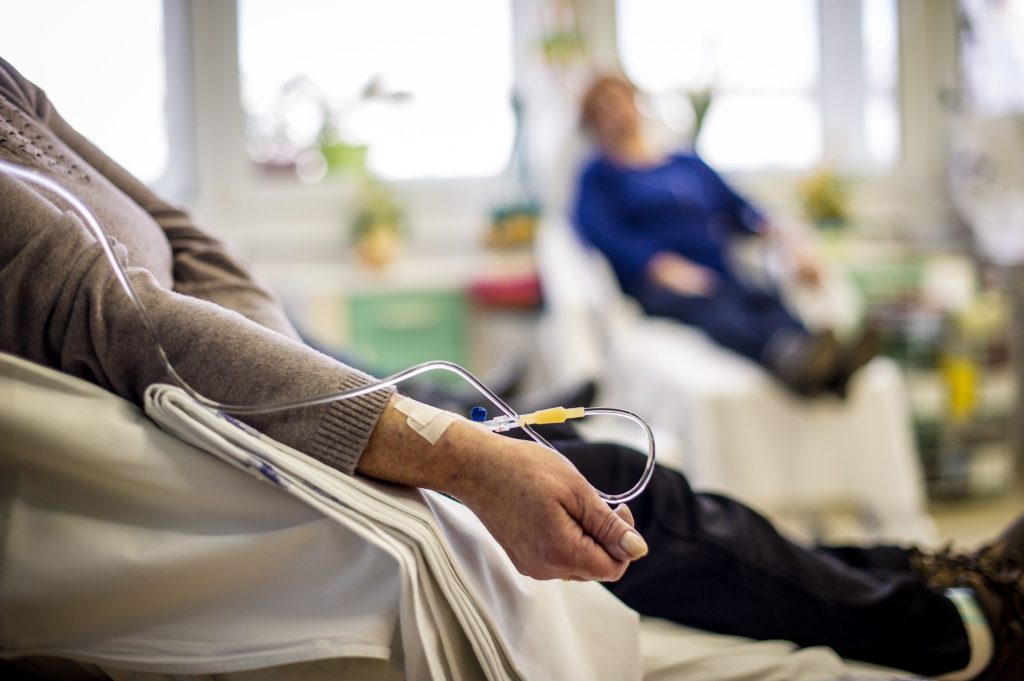
Recently Diagnosed or Relapsed? Stop Looking For a Miracle Cure, and Use Evidence-Based Therapies To Enhance Your Treatment and Prolong Your Remission
Multiple Myeloma an incurable disease, but I have spent the last 25 years in remission using a blend of conventional oncology and evidence-based nutrition, supplementation, and lifestyle therapies from peer-reviewed studies that your oncologist probably hasn't told you about.
Click the orange button to the right to learn more about what you can start doing today.
- You are here:
- Home »
- Blog »
- Multiple Myeloma »
- Drug Toxicity – Relapsed Myeloma
Drug Toxicity – Relapsed Myeloma

An awareness of drug toxicity allows for early diagnosis and intervention, thus supporting longer treatment exposure and better response rates.
Drug toxicity for relapsed, refractory myeloma (RRMM) patients is, in my experience, as deadly to the patient as his/her myeloma is. You may be thinking “wow, that’s a really big statement for David to make. Why is he making such a big statement? Let me explain.
It is well-established that chemotherapy and radiation cause:
And it is the system-wide problems caused by DNA damage, senescence and inflammation that are at the root of every long-term and late stage side effect that result from chemotherapy and radiation for multiple myeloma.
In fact, one of the best kept secrets of conventional oncology is that while chemotherapy and radiation kill cancer, chemotherapy and radiation also promote the relapse of that cancer. (read more 4, 5)
I am posting and commenting on the articles linked below because I have never, ever read a study acknowledging the importance of adverse events, drug toxicity, etc. in the life of a multiple myeloma patient.
The article specifically lists:
- Renal Disease-
- Anemia-
- Bone Disease-
- Immunosuppression and Infection Risk-
- Peripheral Neuropathy-
- Venous Thromboembolism-
- Cardiotoxicity-
- Grastrointestinal Toxicity-
- Ocular Toxicity-
As central treatment-related adverse events for myeloma survivors. It is possible that myeloma patients reading this post read the list of adverse events above and assume that it is the myeloma itself that causes these health challenges.
While monoclonal proteins certainly can damage the patient’s bones, kidney health, nerve function, etc. the issue highlighted in the studies below make the point that it is treatment-related therapies that also cause the problems listed above.
What is the solution to this challenge for all newly diagnosed multiple myeloma patients? The solution, I believe, is best summed up in an essay written by Vincent Rajkumar M.D. a myeloma specialist at the Mayo Clinic in Rochester, MN.
And that essay is called Cure vs. Control- Treatment of Multiple Myeloma
The best example of the cure vs. control debate in action is the FDA approved “standard-of-care” therapy plan for all newly diagnosed myeloma patients. If a patient has early stage myeloma aka myeloma stage 1, he/she is often prescribed the same therapy plan that the stage 3 NDMM is.
While the NDMM patient can usually manage aggressive therapy as his/her first line of treatment, the challenge becomes, as illustrated below, what happens when the NDMM patient relapses? The articles below kick in.
To learn more about relapsed myeloma-
- Chemotherapy Caused My Myeloma Relapse?!?!
- Relapsed, Refractory Multiple Myeloma- Therapy Options
- Biochemical Relapse in Multiple Myeloma- To Treat or Not
- Refractory Relapsed Myeloma- Antineoplaston Therapy
- Multiple Myeloma Relapse? What’s Next? Darzelex?
Have you relapsed? Are you wondering about your next steps? Scroll down the page, post a question or a comment and I will reply to you ASAP.
Hang in there,
David Emerson
- MM Survivor
- MM Cancer Coach
- Director PeopleBeatingCancer
Footnotes for 1,2,3,4,5
- https://www.nature.com/articles/s41392-021-00658-5
- https://www.jci.org/articles/view/158452
- https://www.ncbi.nlm.nih.gov/pmc/articles/PMC3672181/
- https://pubmed.ncbi.nlm.nih.gov/31454672/
- https://unclineberger.org/news-archives/chemo-celluar-senescence/
Review Article Outlines Common Adverse Events and Treatments for Relapsed/Refractory MM
“Patients with relapsed and/or refractory (RR) multiple myeloma (MM) are exposed to many therapeutics over the course of their disease. Though survival has improved, exposure to these drugs for prolonged periods puts patients at risk for treatment-related toxicity. The disease can also have related morbidities, so the cumulative effect on these patients’ quality of life can be staggering.
One review published in Cancers discussed treating and preventing some of the biggest concerns in patients with RRMM, including
- renal insufficiency,
- anemia,
- bone disease,
- and infection.
The article also discussed drug-specific non-hematological adverse events, such as
- peripheral neuropathy;
- venous thromboembolism; and
- cardio,
- gastrointestinal, and
- ocular toxicity.
“Research progress in MM is leading to a dramatic increase in the number of new drugs and the complexity of combination regimens, demanding constant updates on their indications, mechanisms of action, and safety profiles,” the review authors stated. They added, “optimal care of the disease and treatment-related complications has a pivotal role in MM, not only to improve health-related quality of life but also to prolong patients´ survival.”
Further complicating the course of RRMM is that many patients do not receive antiviral prophylaxis, bone-modifying agents, or even simple vaccines (eg, the influenza vaccination). Studies have also shown that organizational obstacles like care delivery in the community setting can complicate the disease course. The review article discusses the necessity of targeted interventions, “such as the integration of primary care providers and clinical decision support systems, are required to implement quality of care in MM.”
With the compounding effect of disease-related morbidity, treatment-related toxicity, and suboptimal adherence to prophylactic strategies, a sufficient quality of life can be difficult to achieve. The authors conclude that nurses should be aware of the current and emerging treatments for RRMM morbidities, toxicity profiles, and side effects.
“An awareness of drug toxicity allows for early diagnosis and intervention, thus supporting longer treatment exposure and better response rates,” the authors concluded…”
Management of Adverse Events and Supportive Therapy in Relapsed/Refractory Multiple Myeloma
“Simple Summary
Conclusions



